Desert Punk: Volume 4
Introduction
Post-apocalyptic wastelands are a penny a dozen in fiction, and the one in Desert Punk is truly a classic of the genre. A devastating war has wiped out most of civilisation, and the dregs and descendants of the survivors now eke out a living in an endless desert where Japan used to be. People being people, many of them survive by preying on the weak, and this is truly a society where might is right. You'd expect there to be a champion standing up for the weak and oppressed, someone still possessing a moral backbone and a sense of justice. You'd be wrong. There is however the Desert Punk, a.k.a. Sunabozu a.k.a. Kanta Mizuno. He's a cold hard mercenary character who is in it solely for the cold hard cash. Diminutive in stature, and masked behind a hi-tech helmet, he's fast, wily and is just as likely to outwit his opponents, as he is to outfight them. He's developed quite a reputation in the Great Kanto Desert, but he has one, or rather two distinct weaknesses. Breasts! He can't get enough of them. And when one day he encounters Junko Asagiri, a rival mercenary with an exquisite cleavage, he's truly met his match. The next four episodes of Desert Punk are presented here on this disc from MVM, along with a handful of extra features.
13. Ideality and Reality
On the way home from a job, Desert Punk and Kosuna come across a couple of orphaned children, sheltering from the sun. Kosuna is all fired up, ready to help them, but Desert Punk just walks on by, impervious to their suffering. That's until he finds the nearest town, so he can come back, collect the children, and take them into town to sell them. But when they return, they find another strandee, a tall, powerful looking individual whom the sun has also caught out. Before Desert Punk helps him, he makes him sign a contract, and he now has an indentured servant. But Masaru Kaido is odd. He's kind, caring, idealistic, brave and opinionated. He insists on burdening himself with the children's care, and he constantly butts heads with Desert Punk's mercenary philosophy.
14. Kosuna and Full-Auto
Kosuna is having second thoughts about becoming the ultimate desert beauty, as she feels her training with Desert Punk is going nowhere. Lost in thought, she almost loses out to an irate victim of Desert Punk's underwear thefts, and like a poor workman she blames her tools. She insists that she needs a better gun, a bigger gun, so giving in Desert Punk takes her to see desert gunsmith Igarashi. The first thing he tells her to do is to dig a hole.
15. Siblings and Childhood Friends
16. Feces and Urine
Desert Punk grew up with the Kawaguchi brothers, and they often got into mischief together. Actually it was Kanta who got the brothers into trouble more often than not, and so a lifelong rivalry began. There was also a Kawaguchi sister, Natsuko, who was an early target of Kanta's lust. Now Natsuko is coming back, and she has a mission for her brothers, and Desert Punk if he is up to the task. She is an official with the West Oasis government now; a position of responsibility, and her task is to ensure the safety of a transport travelling between villages and Water Stations. Its cargo, fertiliser. Of course, this being the harsh desert, there are no fertiliser factories, no mass production, this comes straight from the source, human excretions. It's the lifeblood of the desert, even if it isn't worth all that much, and there are still bandits who would want a piece of that unsavoury pie. Only this time, Desert Punk's rival, Amagumo, leads the bandits. Desert Punk realises that there is more to this mission than just crap.
Picture
This was one of Gonzo's last 4:3 anime, and naturally the transfer reflects that. The live action opening sequence that I've whinged about for the last 12 episodes has gone, as this volume debuts two new credit sequences. The animation is dynamic and vibrant; there is a singular style to the character designs that emphasises bold lines, and high contrast, while the desert setting quite understandably invokes a limited sandy palette of colours, as well as lots of sere, parched landscapes. This is a show where darkness and light play a big part in setting the atmosphere, and it works brilliantly in establishing the mood of the show.
Sound
You have a choice between DD 5.1 English, and DD 2.0 Japanese, along with translated subtitles and an optional signs track. I watched it through in Japanese first and found it to be a wholly enjoyable experience, the stereo doing a good job of conveying the action scenes, the incidental music for once preferable to the theme tunes, and the dialogue clear throughout. As the series has progressed, I've fallen out of love with the dub, as the preponderance of masks has ebbed, and the actors are once again constrained by the need to match lip flaps. The dub has started sounding awkward and cumbersome in comparison to the early episodes, and I find that I've switched back to the original language now. I must admit that re-recording the theme songs with English lyrics is never advisable.
Extras
There are the textless credit sequences of course (the old ones), and the whole thing is rounded off with trailers for Samurai Deeper Kyo and Slayers. Oddly, when the disc comes to the end of the Slayers Trailer, it just stops, instead of going back to the menu.
There is a 9-minute long featurette titled Tokyo Animator College, which sees director Takayuki Inagaki returning to the school he graduated from to pass on his knowledge to the next generation. This is behind the scenes footage coupled with a one-to-one interview.
As Seen On TV is a repeat of the extra from the first volume, showing a broadcast episode of Desert Punk, with so called 'comedy censorship' inserted to cover up profanities and those bits considered too sordid for TV. This time it's episode 16 that gets the comedy bleeps.
Conclusion
Desert Punk Volume 4 if anything, is about misdirection. The first episode and the final two-part story particularly send you in certain directions, before switching things on you for an unexpected twist in the tail. I've also said before that Desert Punk is better with Junko Asagiri than without, and here we have four episodes without her pneumatic presence. Surprisingly then, we get three very enjoyable episodes, and one slightly average one. It turns out you can have good Desert Punk without Junko, and just because Kanta isn't diving into the nearest cleavage, doesn't mean that you won't laugh at the onscreen antics.
I found the first episode to be the most disappointing, with a rather pedestrian story that got bogged down in philosophy and two conflicting worldviews. Masaru Kaido is the anti-Sunabouzu, generous and philanthropic to a fault. It's hard to believe that the man found stranded in the desert could be a product of its harsh society, and indeed the truth behind his origins becomes clear, in something of an ongoing plot thread. He's determined to do the right thing, and take care of the lost orphan children, while Desert Punk is in it for the bucks. Of course he takes advantage of Kaido's generosity, essentially blackmailing him into slavery. What could have been a good tit-for-tat arrangement, milked for comedy, instead stultifies into a debate between Kaido's moralistic beliefs, and Kanto's atavistic self-centred nature. My attention was beginning to drift, until the end of the episode, which turns out to have quite the outrageous punchline, indeed two of them.
The next is a sweet little story about Kosuna, Desert Punk's apprentice. She's getting a little impatient with her apparent lack of progress, and is having second thoughts about her mercenary line of work. Drifting off at a crucial moment almost leads to disaster, and requires a quick save from Kanta. She's quick to blame her tools, too small a gun, and insists that she gets something with stopping power. Of course, with her being so diminutive, the idea of her toting a veritable cannon around is pretty ridiculous, and it looks at first that Kanta and the gunsmith Igarashi are going to teach her a lesson. Except she surprises them all by being able to handle the weapon in question. It doesn't advance the story any (apart from a little foreshadowing by Amagumo), but it's a nice bit of character building for Kosuna, and a rather sweet journey of self-discovery for her.
We get back to regular service for the final two-part story, with a mission for Desert Punk to complete, a villain to ridicule, and a femme fatale to get him into situations that he would be better off avoiding. Keeping Junko's seat warm this time is childhood friend Natsuko, sister to the Kawaguchi brothers, Desert Punk's rivals. She's filled out some since Kanta last saw her; enough to get the nosebleed flowing and his brain stop working. He's drawn into one of those missions against intolerable odds again, and against it all, we have the fond memories of childhood, when Kanta, Natsuko, and her brothers all used to play together. It looks like a happy reunion, but there is more than meets the eye to this mission. The comedy is already there, in a story which follows Desert Punk's basic template, but we also get a literal load of toilet humour as well, and somehow the sound of a swarm of flies manages to get the unsavoury message across with queasy ease.
It's here that we have another of those forward looking predictions, indicating big developments in the world of Desert Punk some ten years down the line. We had that in volume 3's two-part story as well, and it got me curious and wandering through the Interweb. Don't make the same mistake I did, or you'll run into some egregious spoilers for subsequent volumes. But just so as you aren't disappointed by volume 6, Desert Punk is one of those ongoing manga, and a lot of what is hinted at and foreshadowed here, won't be in the animation. As usual, it's down to the animators to fashion an ending that satisfies and justifies your investment in the show, while pointing to the manga for those who need a further fix.
There's no Junko in this volume (except for the new opening sequence), but surprisingly, this collection of episodes is as good as those in which she appears, except for the shaky first episode, and even that has a decent punchline to it. Desert Punk is far from the groundbreaking brilliance I expected it to be, but it still provides solid, if profane entertainment. It's definitely an option to consider if you're looking for a new anime to keep your DVD player warm.
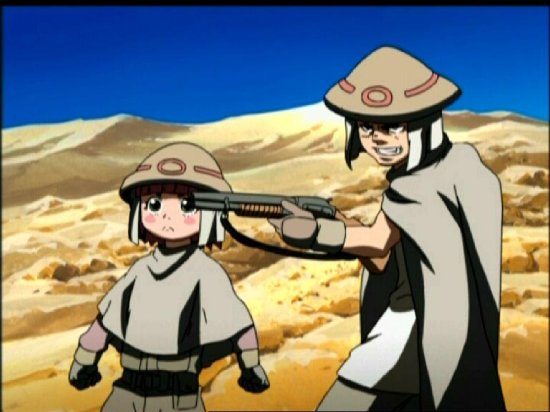
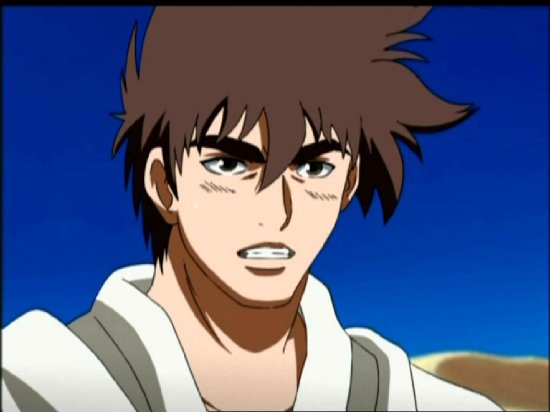
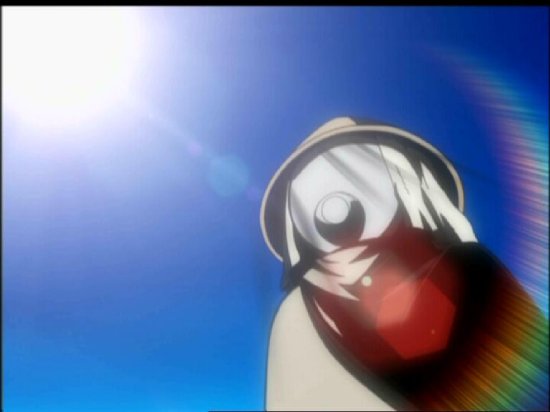
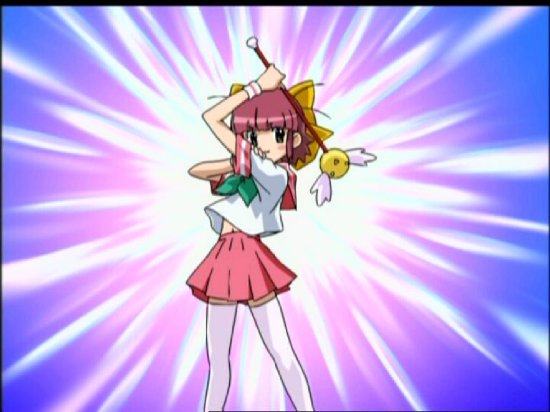
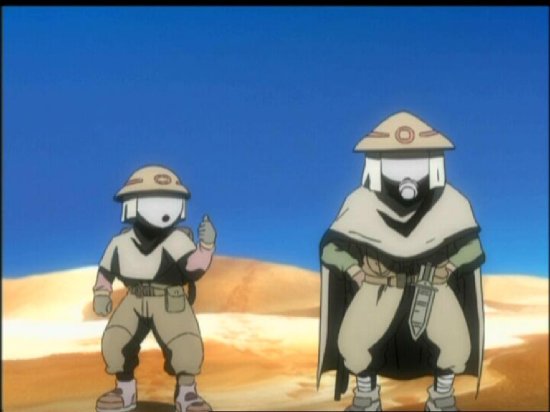
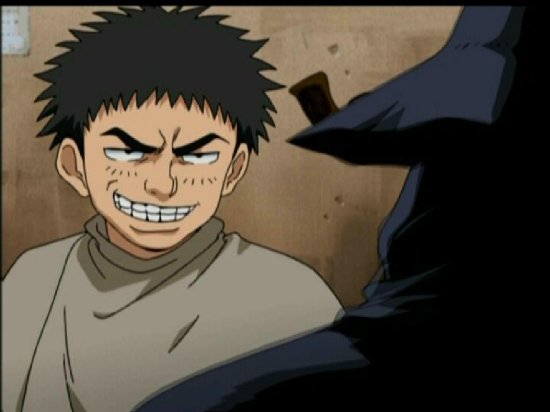
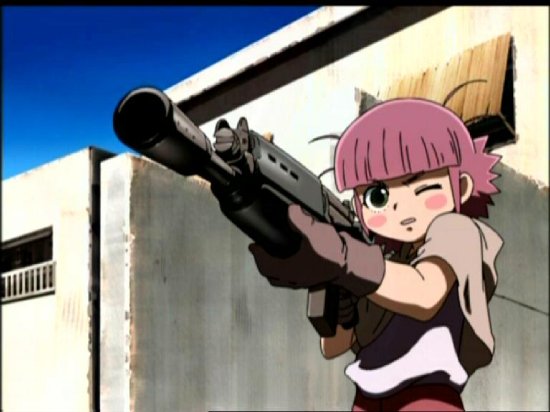
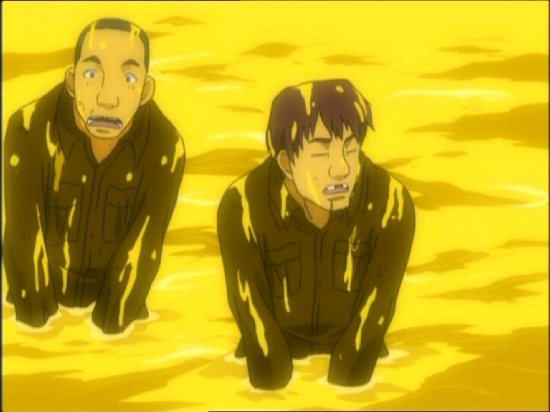
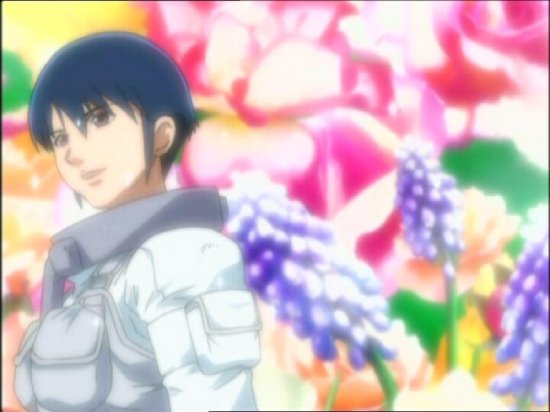
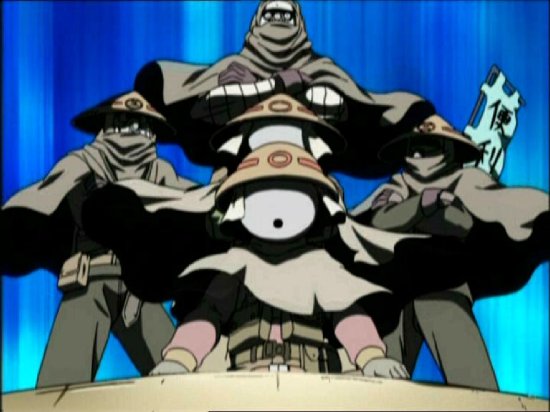
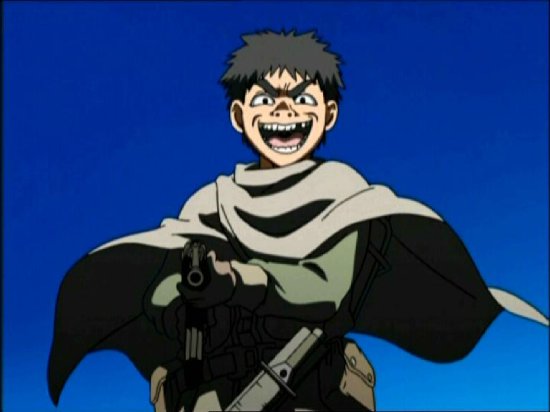
Your Opinions and Comments
Be the first to post a comment!